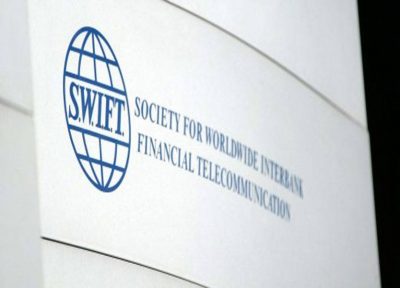In Major Concession, Trump Will Allow Iran to Remain Connected to SWIFT. Alternative Currency Transfer System Currently Developed by Russia

In a stark reversal from its position just days earlier, the Trump administration is expected to allow Iran to remain connected to the SWIFT banking system the Washington Examiner reports, in what amounts to a major concession to European allies who have been pressuring senior U.S. officials to keep this key lifeline to the Islamic Republic open.
As recently as this weekend, Reuters reported that in order to further isolate Iran from the global financial community, Treasury Secretary Mnuchin said that the U.S. Treasury was in negotiations with the Belgian-based financial messaging service SWIFT which intermediates the bulk of the world’s cross-border dollar-denominated transactions, on disconnecting Iran from the network. Washington has been pressuring SWIFT to cut Iran from the system as it did in 2012 before the nuclear deal.
The latest reversal comes as a result of ‘ongoing talks between top U.S. officials and European allies “who have been pressuring the Trump administration to take a softer line on Tehran” ahead of the Nov. 4 implementation of new sanctions on Iran.
The unexpected move has been met with “frustration” by Iran hawks both on Capitol Hill and elsewhere who have argued that SWIFT continues to provide Iran with a critical financial lifeline which it is using to fund terrorist operations across the region despite its ailing economy. Yet despite opposition from the “hawks”, Iran will remain connected to the SWIFT system
As reported previously, Trump has been under pressure for months from European allies to keep Iran connected to SWIFT, despite fierce opposition to the move among some inside the administration and many legislative allies on Capitol Hill.
In the past months, as European allies pressured the Trump administration to take a softer line with Iran, SWIFT has emerged as a key sticking point. While the Trump administration had vowed to choke off Iran’s financial routes, senior officials appear to have softened that stance in the face of European pressure.
In August, Germany’s Foreign Minister Heiko Maas called in August for a system that was an alternative to SWIFT and would allow “financial independence” from Washington, that would possibly keep the nuclear agreement with Iran alive.
Meanwhile, as Europe scores a diplomatic victory, the internal battle over Iran’s access to SWIFT – which has been brewing for months – will likely remain at the forefront ahead of the implementation of new sanctions next month due to opposition by the Israelis and others who aim to see Iran completely iced out of the international banking system.
“The Europeans are clowning the Americans,” said one source familiar with the recent discussions between American and foreign officials. “They sold [Treasury Secretary Steve] Mnuchin on this idea that keeping Iran on SWIFT will generate intelligence—the word they keep using is ‘leads’—and Mnuchin is now echoing Obama talking points about how sanctioning some banks is enough.”
In addition to criticism from within the neocon community, Trump’s reversal is also odd in that it contrasts with what Steven Mnuchin said as recently as a few days ago: as we reported on Sunday, he said that the administration is working to prevent sanctioned transactions from taking place via SWIFT.
“I can assure you our objective is to make sure that sanctioned transactions do not occur whether it’s through SWIFT or any other mechanism,” he told Reuters. “Our focus is to make sure that the sanctions are enforced.”
While Mnuchin would not offer details on the nature of U.S. talks with SWIFT leaders, he vowed the administration would “quickly” identify banks that can continue conducting transactions under the rubric of humanitarian aid to Iran.
“We want to get to the right outcome, which is cutting off transactions,” Mnuchin said.
Separately, a Treasury Department spokesman told the Free Beacon the administration will closely police the body’s activities to ensure that no sanctioned Iranian entities can use it.
“Treasury has made it very clear that we will continue to cut off bad Iranian actors, including designated banks, from accessing the international financial system in a number of different ways,” the official explained. “We will also take action against those attempting to conduct prohibited transactions with sanctioned Iranian entities regardless of the mechanisms used.”
The latest statement from Mnuchin and other Treasury Department officials, however, has not assuaged fears and some of the biggest hawks demand a fullblown crackdown. Mark Dubowitz, a sanctions expert and chief executive of the Foundation for Defense of Democracies, which has pushed hard for crippling sanctions on Iran, told the Free Beacon that Iran must be fully iced out from SWIFT, as was done with North Korea recently as a result of its rogue nuclear program.
“Recently SWIFT’s board of directors wisely expelled designated North Korean banks without EU direction; they would be wise to do the same thing against banks used by the Islamic Republic of Iran to finance its dangerous and destructive activities,” Dubowitz said. “The SWIFT board backed by the U.S. Treasury Department should preserve the integrity of the global financial system; allowing bad banks to stay on SWIFT to threaten the integrity of that system is bad practice and bad policy.”
While the US decides whether or not to implement full sanctions on Iran, the possibility remains that Tehran may opt for an alternative currency transfer system being currently developed by Russia, and one which according to unconfirmed reports has also seen tentative participation interest by Europe. Should Trump engage in a full lockdown, that may be just the catalyst that prompts Europe to join the “Russian version” of SWIFT, thereby further eroding the dollar’s “weaponized” influence around the globe.
*
Note to readers: please click the share buttons above. Forward this article to your email lists. Crosspost on your blog site, internet forums. etc.

